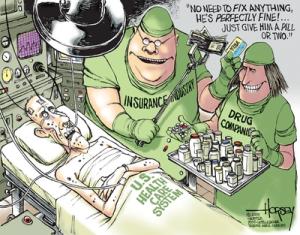- MENU
- HOME
- SEARCH
- WORLD
- MAIN
- AFRICA
- ASIA
- BALKANS
- EUROPE
- LATIN AMERICA
- MIDDLE EAST
- United Kingdom
- United States
- Argentina
- Australia
- Austria
- Benelux
- Brazil
- Canada
- China
- France
- Germany
- Greece
- Hungary
- India
- Indonesia
- Ireland
- Israel
- Italy
- Japan
- Korea
- Mexico
- New Zealand
- Pakistan
- Philippines
- Poland
- Russia
- South Africa
- Spain
- Taiwan
- Turkey
- USA
- BUSINESS
- WEALTH
- STOCKS
- TECH
- HEALTH
- LIFESTYLE
- ENTERTAINMENT
- SPORTS
- RSS
- iHaveNet.com: Politics
by Phil Gingrey, M.D.

© David Horsey
Government-run Healthcare Would Backfire, Making 'Public Option' the Only One: Former DNC chair's government-run insurance program is sure to backfire. Just ask his wife the doctor
Former Democratic National Committee Chairman Howard Dean has recently inserted himself into the debate on health reform, creating a website and collecting signatures on a petition calling for a "public option" as part of any health reform bill.
The action is unsurprising from an individual who previously called President Obama's healthcare reform plan "perfect" and stated that "it's ridiculous to say care would be inferior" in the government-run plan.
But even as Governor Dean attempts to attract support for government-run healthcare, it's worth pointing out that the facts --not to mention his own personal experience-- don't mesh with his rhetoric.
As Vermont's governor, Dean aggressively pursued expansions of government-run health insurance -- and bragged that doing so "was very cheap to do." Unfortunately for beneficiaries on state-run Medicaid and children's health insurance, that "cheap" coverage often came at a very steep price.
Low reimbursement rates mean that few doctors actually participate in the government-run plan, so patients can't see their personal physician -- and may not be able to see any physician when they need one.
In Vermont, one of those physicians whom Medicaid beneficiaries couldn't visit was Judith Steinberg -- Howard Dean's wife.
In 1998, low reimbursement rates -- coupled with the impact of additional regulations her husband signed into law -- prompted Dr. Steinberg to end participation in the state's largest Medicaid-managed care program.
As a result, the residents of Shelburne in Vermont's largest Medicaid plan lost access to the only primary care provider in town who would accept their insurance.
I don't fault Dr. Steinberg for her decision -- it may well have been the only rational business decision for her to make.
But for Governor Dean to claim that a government-run plan won't be "inferior" is to ignore his wife's experience, and that of the many beneficiaries who lost access to their physician due to Medicaid bureaucracy and poor coverage.
My fear is that creating a government-run health insurance plan wouldn't guarantee quality care by physicians -- in fact, it will not guarantee care at all.
The quality of care in a government-run health plan may seem irrelevant to those individuals who are happy with the coverage they currently have -- after all, President Obama promised during his campaign that, "If you like the plan you have, you can keep it."
But most individuals don't really have their own health coverage -- they get it from their employers. And if the coverage provided in the government-run plan is cheaper than what employers are paying now, logic suggests that employers will drop their current plans and place their workers in the government plan.
Estimates from independent actuaries at the Lewin Group suggest that well over half of all Americans currently with employer-sponsored health coverage -- nearly 120 million individuals -- would lose their current coverage due to the creation of a government-run health plan. And the change in coverage would not be a "choice" -- according to Lewin studies, employers would drop their plan options, dumping employees into the government-run health plan to save money.
So the end result of the "perfect" plan supported by Governor Dean would be most people losing the coverage they have, while ending up on a government-run plan that dominates the healthcare marketplace.
Physicians would be forced to accept the government's low reimbursement rates--but my experience, to say nothing of Dr. Steinberg's, strongly suggests that many will not. Some baby boomer doctors may view a move to government-run health insurance as a reason for them to take early retirement.
Some physicians may refuse all insurance entirely, relying solely on a "cash-and-carry" approach to treating patients.
Other physicians may be forced to lay off staff to compensate for a sharp drop-off in income. And other would-be physicians may decide not to practice at all -- forsaking medical school for other careers that could be more rewarding and less bureaucratic than government-dictated medicine.
Republicans believe that a government-run health plan that doesn't guarantee access to care -- like the Medicaid program in Governor Dean's hometown -- isn't real coverage at all.
That's why House Republicans have formed a working group, on which I sit, to develop solutions that will expand access to affordable, quality healthcare.
Our working group's proposals will keep doctors and patients, not government bureaucrats, at the center of healthcare.
Governor Dean may claim that a government-run health plan would not provide "inferior" healthcare, but the citizens of his hometown -- and even his wife -- may disagree.
Republicans believe that Americans deserve better. And we look forward to working to achieve that aim.
U.S. Congressman Phil Gingrey, M.D. represents Georgia's 11th Congressional District and is cochairman of the GOP Doctors Caucus.
AMERICAN POLITICS
WORLD | AFRICA | ASIA | EUROPE | LATIN AMERICA | MIDDLE EAST | UNITED STATES | ECONOMICS | EDUCATION | ENVIRONMENT | FOREIGN POLICY | POLITICS
Receive our political analysis by email by subscribing here
© Tribune Media Services